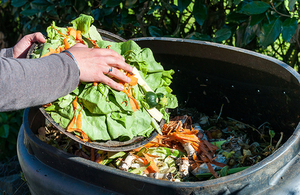A greener Christmas is the best present for the environment.
Tips and information to encourage people to minimise waste this Christmas

Composting can help to make Christmas greener
The festive period is a hotbed for food and packaging waste. Recycling charity, WRAP reports that each year UK households throw away enough gravy to accompany Christmas dinner for the whole country and last Christmas we consumed enough card packaging to cover Big Ben nearly 260,000 times.
The Christmas foods most thrown away in UK homes each year are potatoes (710,000 tonnes), poultry (100,000 tonnes), carrots (96,000 tonnes), and gravy. (Source: Household food waste: restated data for 2007-2015)
Small steps make a big difference and the government is recommending a series of tips to minimise waste this Christmas, including reusing items such as plastic carrier bags and envelopes, and buying items with less packaging or second-hand items.
This government is passionate about tackling food waste. In 2019 alone, Ben Elliot has taken up the mantle of Food Waste Champion, launched the Step Up to the Plate pledge which around 130 businesses have signed, and launched a £15 million scheme to help reduce food waste from all sources, including through tackling barriers to redistribution.
Tips for minimising waste over the festive period
-
Avoid wasting food. Overindulgence is as synonymous with Christmas as Santa but the more food we buy, the more likely it is to be wasted. Instead freeze your Christmas leftovers, plan your meals using WRAP’s handy portion calculator and give loose apples and potatoes a go so you don’t waste the rest of the pack.
-
Contact your local Furniture Re-use Network - they distribute unwanted furniture and household goods to those in need.
-
Think before you shop. For example, you could buy things with less packaging, or second-hand items. To avoid taking home more carrier bags, choose reusable shopping bags: keep them in the car boot or pop a folded cotton bag in your handbag or pocket so you always have one to hand.
-
Recycle or re-plant your ‘real’ Christmas tree this year. ‘Real’ Christmas trees can be recycled and turned into chippings for parks. Some local authorities have special collections or organise drop-off points. Otherwise they can be taken to your household waste recycling centre.
-
Unwanted decorations in good condition can be donated to charity shops for re-sale and re-use.
Top statistics
-
At Christmas we consume enough card packaging to cover Big Ben nearly 260,000 times.
-
Last Christmas we consumed an estimated 289,171 tonnes of card packaging.
-
One million tonnes of paper and card packaging were collected for recycling last year.
-
Over 400,000 tonnes of card packaging were not collected for recycling last year.
-
The amount of poultry thrown away each year in UK homes is enough to make 800 million Boxing Day curries.
-
A herd of 636,000 reindeer weighs the same as the amount of carrots thrown away in UK homes each year.
-
Defra awarded £1.9million in funding to Fareshare in May 2019, helping redistribute even more food around the UK. This included preventing 2,000 frozen turkeys from Gressingham Foods from going to waste this Christmas (already almost double the number of turkeys Fareshare redistributed last year).
Environment Minister Rebecca Pow, said:
Christmas is a time to enjoy indulging with the family, but that doesn’t have to come at the expense of our environment.
Each year, UK households throw away enough gravy to accompany Christmas dinner for the whole country and last Christmas, we consumed enough card packaging to cover Big Ben nearly 260,000 times.
Without the support of people across the country, we simply cannot achieve our goal of reducing unnecessary waste and leaving the environment in a better state for future generations. By making a few small changes - buying items with less packaging, cooking up delicious dinners from your leftover turkey, reusing last year’s wrapping paper - we can all enjoy a greener Christmas to help us save money and the planet.
The Resources and Waste Strategy
Our Resources and Waste Strategy sets out how we will preserve our stock of material resources by minimising waste, promoting resource efficiency and moving towards a circular economy. At the same time we will minimise the damage caused to our natural environment by reducing and managing waste safely and carefully, and by tackling waste crime.
It combines actions we will take now with firm commitments for the coming years and gives a clear longer-term policy direction in line with our 25 Year Environment Plan. This is our blueprint for eliminating avoidable plastic waste over the lifetime of the 25 Year Plan, doubling resource productivity, and eliminating avoidable waste of all kinds by 2050.
Read the full Resources and Waste Strategy